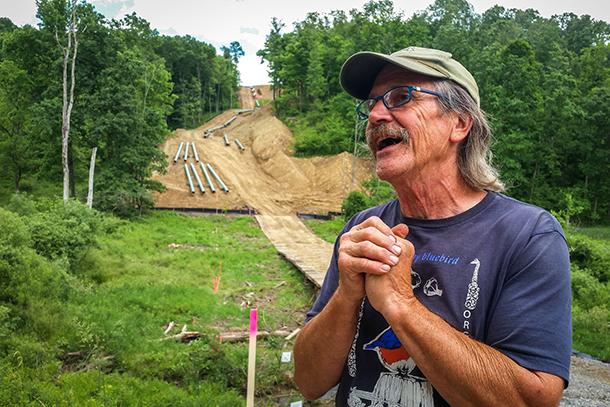Natural gas companies are using hardball tactics to expand their network of pipelines
Mick Luber, an eastern Ohio farmer, has had to contend with multiple natural gas companies such as Marathon and Kinder Morgan that want to route their pipelines through his farm.
Fracking companies in Pennsylvania want to expand their network of pipelines for the export of liquid by-products of natural gas, such as ethane and butane, which are used to make plastics — and to achieve this they are using the legal principle of eminent domain to seize private land.
Industry executives and spokespeople argue that natural gas access is a public good, which permits them to invoke eminent domain if a landowner refuses to let them dig. But some of the proposed pipes would carry by-products of fracking to places outside the US, so a number of landowners are fighting back, insisting that the companies are not acting in the public interest.
Farmer Mick Luber is one of these landowners. He runs an organic farm in Harrison County, which is in eastern Ohio. Recent years have brought a compressor station and multiple well sites so close to his home that they wake him up at night. Now pipeline companies are knocking on his door.
“They wanted to come right down through this main field, and go up over the top of that hill,” Luber says. “There’s a spring right up there. That’s the most fertile part of this farm.”
The oil and gas giant Marathon is already building a pipeline on the southern border of Luber’s farm. In the area of the valley where pipes are lined up, waiting to be connected, the ground has been stripped bare. “This is what you end up with,” Luber says. “This was all woods.”
Shell is also planning a line here. So when Kinder Morgan showed up, Luber said no. No pipeline, not even a survey. Kinder Morgan sued.
One of the main arguments in Luber’s legal defense deals with how Kinder Morgan plans to use the pipeline — not to transport natural gas for home heating, but to send ethane to Canada for NOVA Chemicals to make plastics. Ethane, along with propane and butane, is known as a natural gas liquid. Some landowners are arguing that they shouldn’t have to give up their property rights for companies to transport these liquids to make plastics, especially if they’re being sent to foreign countries.
But Kinder Morgan spokesperson Allen Fore says, “Yes, they should. Plastics are in the public interest. You tell me anybody in this country that doesn’t use plastics in some way, and that plastics aren’t critical to their everyday lives, from cups to medical devices to automobiles."
One of the biggest headline grabbers on this issue has been Sunoco’s Mariner East project. It includes two pipelines, an older one that’s been repurposed, and a newer one, both carrying natural gas liquids. The new line begins in Ohio, near Mick Luber’s farm in Harrison County, and runs through Pennsylvania to the Marcus Hook Industrial Complex on the Delaware border near Philadelphia. From there, the propane is being shipped to Europe.
“That’s not a need of the Commonwealth,” says attorney Rich Raiders, who represents about a dozen landowners in Pennsylvania against eminent domain actions.
One might think the federal government would have a say in whether transporting these natural gas liquids to make plastics is important enough to usurp individual property rights, but that isn't always the case. If this were a natural gas pipeline, the Federal Energy Regulatory Commission (FERC) would have authority over siting its route. But FERC "has no authority to regulate natural gas liquids in the United States at all,” Raiders says.
When FERC does have authority, such as siting for natural gas pipelines, landowners have a say in how they’re routed. “There’s a public, eyes-open discussion,” Raiders explains. “Whereas for a natural gas liquids line, that’s between the individual landowner and the pipeline operator, and no government entity is involved at all.”
Attorney Nicholas Anderson also represents a landowner in Harrison County, Ohio, who is fighting Sunoco’s eminent domain action. “The bottom line is that, when they’re approaching landowners in Ohio, they have this big stick called eminent domain,” Anderson says. “So they say, ‘Look, we’ll give you X number of dollars per linear foot. But if you don’t accept that, we’re just going to take your property.’ And that is where we have a problem.”
While the proper permits must still be obtained from the federal Pipeline and Hazardous Materials Safety Administration for large-scale Earth disturbances and for digging around bodies of water for pipeline routes, eminent domain cases get decided in state courts.
So far this process has produced conflicting results: The Kentucky Supreme Court recently let stand a lower court ruling that the pipeline company, in that case, is not a public utility, which means it does not have the power of eminent domain to site a natural gas liquids pipeline. But Pennsylvania’s Commonwealth Court sided with Sunoco, ruling in July 2016 that the company is a public utility whose authority extends to all 17 counties along its contested pipeline’s path.
Kinder Morgan recently announced they would reroute around Mick Luber’s farm, but Luber doesn’t see it as a victory.
“As long as these guys are still doing this stuff, what is the victory?” Luber asks. “You know, we can’t stop being vigilant. People have got to keep standing in their way.”
This article is based on a story reported by Julie Grant of the public media project, the Allegheny Front. The report aired on PRI’s Living on Earth with Steve Curwood.
